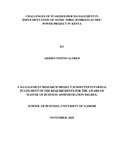| dc.description.abstract | Implementation of Projects, especially huge ones with various stakeholders have faced several
challenges over the recent years. Some of the challenges include lack of process owner buy-in,
lack of champion support, stringent demands or conditions from project sponsors, lack of support
from surrounding community, resistance to change, cultural barriers and at times language
barrier among others. The importance of Stakeholder management is to support an organization
in achieving its strategic objectives by interpreting and influencing both the external and internal
environments and by creating positive relationships with stakeholders. Management of
stakeholder expectations and agreed objectives is crucial to overall project success.
This study sought to establish challenges of stakeholder management in the implementation of
Sondu Miriu Hydro Power Project in Nyanza province, Kenya. The objectives of the study were
to establish the extent to which the surrounding community’s degree of expectations and that of
other stakeholders on the project is a challenge to its planned implementation, to evaluate the
impact of resistance to change by local residents on the strategic achievement of the project and
to assess the benefits if any of stakeholder participation both to the project and stakeholders.
The study captured six stakeholder groups thus; the surrounding community, members of the
Technical Committee (TC), staff employed by the project, Civil Society Organizations
(CBOs/NGOs), the Provincial Administration and Contracted Partners. The research targeted all
the stakeholders without concentrating on those affected by relocation. As a result, the data
captured covered those who were relocated and those who were affected one way or another, but
were not relocated. The analyses show that the majority (up to 90%) of those relocated by the
project were satisfied with the relocation process hence implying that dissatisfaction could have
resulted from other sources other than relocation. Majority of the respondents indicated that they
had been stakeholders in the project for over 5 years implying that the interviewees had a very
good understanding of the project. Their responses can therefore be used for analysis without the
fear of little knowledge on the subject matters. The study shows that the surrounding community’s degree of expectations and that of other stakeholders on the project is a challenge to its planned implementation. All respondents were aware of resistance to implementation of the project, and all were unanimous that the issues that led to the resistance were those raised by the surrounding community. The study has established that the best approach from addressing complaints that may have been raised was incorporation of the local community and other stakeholders into the project implementation. Being participants in the implementation makes the community’s expectations more realistic in addition to being aware of the capacity and limitation of the project implementers in addressing some of their demands. | en |

